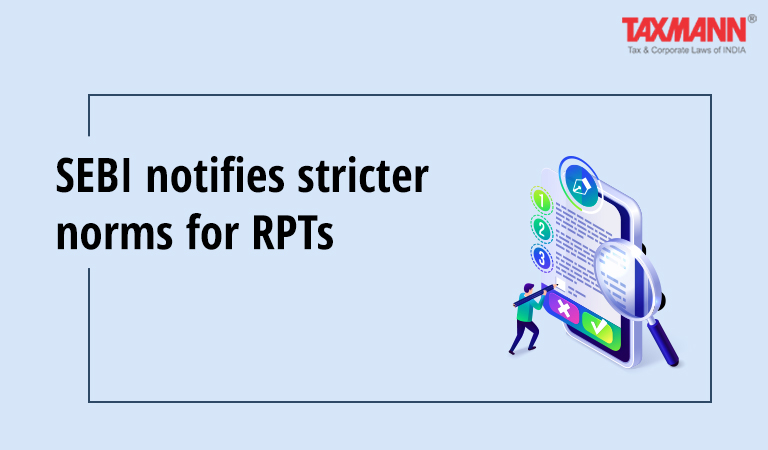SEBI notifies stricter norms for RPTs
- Blog|News|Company Law|
- 2 Min Read
- By Taxmann
- |
- Last Updated on 16 November, 2021

[2021] 132 taxmann.com 113 (Article)
SEBI in its Board meeting held on September 28, 2021, approved the amendments in RPT framework that were proposed by the Working Group1 (‘WG’) in January 2020 relating to the following areas:
-
- Definition of Related Party;
- Definition of Related Party Transactions (‘RPTs’);
- Thresholds for classification of RPTs as material;
- Process followed by Audit Committee for approval of RPTs;
- Disclosure requirements.
The notification amending SEBI (Listing Obligations and Disclosure Requirements) Regulations, 2015 (‘Listing Regulations’) has been issued on November 9, 2021. Certain amendments to come into force from April 1, 2023 and remaining from April 1, 2022. The listed entities will be approaching the Audit Committee for prior approval for RPTs proposed to be undertaken w.e.f. April 1, 2022 before the end of current financial year.
In view of the recent amendment made in Listing Regulations w.e.f. September 7, 2021 the framework for RPTs is also applicable to a High-Value Debt Listed Entity (‘HVDLE’).
This write up discusses the key amendments approved by SEBI in the Board meeting held on September 28, 20213 and notified vide SEBI (Listing Obligations and Disclosure Requirements) (Sixth Amendment) Regulations, 20214 and immediate actionable, apart from amending the RPT policy.
Definition of Related Party widened:
-
- All persons or entity belonging to the promoter (P) or promoter group (PG) will be regarded as related party, irrespective of its shareholding in the listed entity;
- Any person or entity holding, directly or indirectly (on a beneficial basis under Section 89 of CA, 2013), 20% or more of the equity shareholding in the listed entity will be regarded as a related party;
- Any person or entity holding, directly or indirectly (on a beneficial basis under Section 89 of CA, 2013), 10% or more of the equity shareholding in the listed entity will be regarded as a related party w.e.f. April 1, 2023
The intent is to ensure that none of the related party is able to escape classification on account of manipulation or active engineering, despite operating as a single economic unit. Identification as a related party should not be a concern for companies. All persons or entities belonging to the ‘promoter’ or ‘promoter group’ to be identified, irrespective of their shareholding in the listed entity.
Further, considering the comments received, citing practical difficulties in computation of indirect shareholding for the purpose of defining related party, SEBI confined the definition of related party to any person or any entity, either directly or on a beneficial interest basis.
Click Here To Read The Full Article
Disclaimer: The content/information published on the website is only for general information of the user and shall not be construed as legal advice. While the Taxmann has exercised reasonable efforts to ensure the veracity of information/content published, Taxmann shall be under no liability in any manner whatsoever for incorrect information, if any.

Taxmann Publications has a dedicated in-house Research & Editorial Team. This team consists of a team of Chartered Accountants, Company Secretaries, and Lawyers. This team works under the guidance and supervision of editor-in-chief Mr Rakesh Bhargava.
The Research and Editorial Team is responsible for developing reliable and accurate content for the readers. The team follows the six-sigma approach to achieve the benchmark of zero error in its publications and research platforms. The team ensures that the following publication guidelines are thoroughly followed while developing the content:
- The statutory material is obtained only from the authorized and reliable sources
- All the latest developments in the judicial and legislative fields are covered
- Prepare the analytical write-ups on current, controversial, and important issues to help the readers to understand the concept and its implications
- Every content published by Taxmann is complete, accurate and lucid
- All evidence-based statements are supported with proper reference to Section, Circular No., Notification No. or citations
- The golden rules of grammar, style and consistency are thoroughly followed
- Font and size that’s easy to read and remain consistent across all imprint and digital publications are applied



 CA | CS | CMA
CA | CS | CMA
